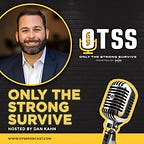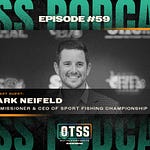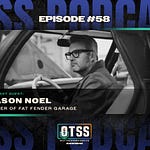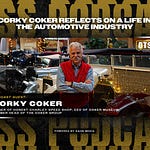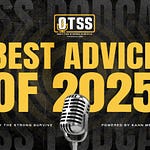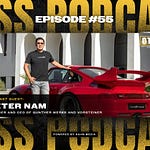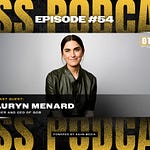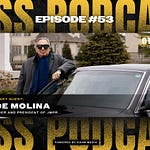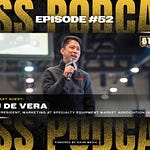Some entrepreneurs who started their own businesses can envy those who run their families’ companies. After all, many of these multi-generational leaders didn’t have to go through the often painful process of starting a brand from scratch. While that may be true, running a family business comes with a whole other set of unique challenges. And keeping that business going for generations also requires a lot of skill and knowledge.
On this special episode of the “Only The Strong Survive” podcast, host Dan Kahn discusses the intricacies and difficulties of making multi-generational businesses thrive with three great guests, including Malco Automotive Products’ Seth Glauberman. Malco, an automotive detailing products company, was founded in 1953 by Seth’s grandfather. Also part of the discussion is David Borla from Borla Exhaust, a well-known aftermarket exhaust manufacturer that was created by David’s parents in 1978. Adding her expertise is Melanie Hellwig White of Hellwig Suspension Products, a helper spring and sway bar brand that Melanie’s great-grandfather and grandfather started in 1946.
Click on the icon above to watch the latest episode of “Only The Strong Survive,” as all three leaders share their experiences on what it takes to keep a family business going. Here are our top five takeaways from the episode:
You can’t be forced into a family business and be successful.
Multi-generational family businesses are legacies and not just brands.
There is a lot of pressure associated with that legacy.
Change in a family business can be challenging but necessary.
Being part of a multi-generational brand creates a long-term outlook.
Running the Family Business Has to be a Choice
One interesting trait Melanie, David and Seth all share is that none of them were pressured to join the family business. They were free to choose their own paths and didn’t immediately join their family’s brands. That freedom resulted in their desire to be part of their respective companies rather than it feeling like a requirement. Wanting the next generation to continue your business might be strong, but it needs to be their choice for the business to be successful.
“I think what my parents did an excellent job at was there was no pressure. We kept things, and we still do, very separate,” says Melanie. “It is hard because there is so much passion in a family business. In some ways, I think I was a little discouraged (from joining the business). Maybe not discouraged but not encouraged. It was very neutral on whether or not my family wanted the next generation to get involved.”
It’s Not Just a Business, It’s a Legacy
One key difference between running a family business and starting your own is that you are part of something much larger. Melanie, David and Seth’s brands all stretch back over decades. The businesses have always been part of the trio’s lives, even as children way before their official start dates. That long-term involvement creates a different viewpoint and the realization that their family companies are legacies, not just brands.
“I used to come in (as a kid) and put clamps together,” says David. “I have had the opportunity, and I am sure it is like that for Melanie and Seth, too, to have seen the business even when I wasn’t involved in it. That is a really important perspective I think that we have as the next generation. Yes, there is this official time period that we have been working here, but we witnessed much more than that. For me, and you guys, I am sure it is always part of my thinking, no matter what I am doing, that I am a part of something a lot bigger, and that goes back a lot further than me.”
That Legacy Brings Pressure, Too
Being part of something larger than yourself and a legacy is a rewarding experience. However, there is also a lot of pressure that comes with it as well. Carrying on that legacy can land heavily on the shoulders of the leaders of multi-generational family businesses. There is also a strong desire to do right by those who came before you and make your family proud.
“This (business) was a passion project of my great-grandfather. I come into work every day, and I sit at my great grandfather's desk. There is a part where it is so integrated into everything here. I am incredibly lucky to have this awesome brand and this legacy,” says Melanie. “There is a lot of pressure with this legacy, though, and, I won’t lie, it has kept me up at night because I want to do well, and I want to make my grandpa proud.”
You Can’t Get Stuck in the Past
With long and rich histories of brands that go back decades, there can be a lot of traditional ways of doing business that develop. While those traditions and relationships are essential to a brand’s legacy, you can’t remain firmly entrenched in the past, either. Multi-generational family businesses need to be as nimble and adaptable as upstarts to survive in a constantly changing business environment.
“Our company has probably reinvented itself five times. We started by doing cleaning chemicals that were sold to dairy distributors on the janitorial side. You don’t get milk dropped off at your house now, so that’s gone,” says Seth. “We were always a specialty chemical manufacturer at our core focused on meeting the needs of our customers. But if you look at our business, there are three of four times when it really changed. My dad always talks about the paradigm shift, how things change and how you have to adapt to it. The reason we are still around is because we kept adapting versus staying in one spot.”
A Long History Creates a Long-Term Outlook
Another unique aspect of being part of a multi-generational family-run business is that it naturally creates a long-term vision. While some companies obsess over the next quarter’s profits and maximizing shareholder values, Seth, Melanie and David have a different outlook. Being part of their respective businesses since childhood gives them a deep understanding of playing the “long game” and knowing that short-term gain can come at the expense of overall company health.
“There is just this intuitive feel and knowledge that you have, especially as a family having built this thing from nothing. That knowledge and experience transfer from one generation to another. It is knowing what the right thing is to do and knowing when it is the right time to take a little bit less profit in order to invest in the long-term health of the business,” says David. “The other thing is a lot of these PE guys are looking to flip the businesses every two or three years. They don’t care what is going to happen in seven or eight years to the business. Whereas we don’t necessarily have that mindset, so we can play the long game.”


